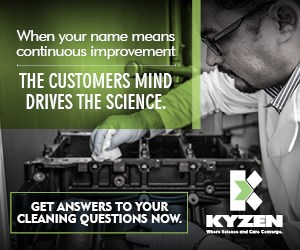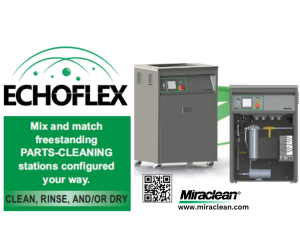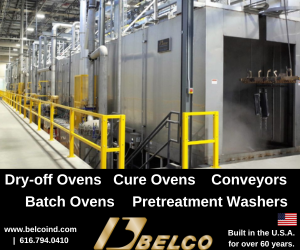Pretreatment Over Pretreatment, Part 2
Question: Your response to “Pretreatment Over Pretreatment” in the February Painting Clinic should be amended to warn him that running aluminum through an Iron phosphate spray washer would make the sludge in the washer a hazardous waste (according to an earlier comment you made about a year ago). I believe the problem is created by the definition of acid washing of aluminum is a categorical hazardous waste (by EPA definition). When he cleans the washer, all the sludge that is normally sent to the landfill or flushed down the sanitary sewer would be considered an illegal disposal of hazardous waste.
Question:
Your response to “Pretreatment Over Pretreatment” in the February Painting Clinic should be amended to warn him that running aluminum through an Iron phosphate spray washer would make the sludge in the washer a hazardous waste (according to an earlier comment you made about a year ago). I believe the problem is created by the definition of acid washing of aluminum is a categorical hazardous waste (by EPA definition). When he cleans the washer, all the sludge that is normally sent to the landfill or flushed down the sanitary sewer would be considered an illegal disposal of hazardous waste. Yea, I know it’s stupid, but that’s the law. D. R.
Answer:
Thank you for calling this to my attention, D. R. In D. W.’s question in the February 2003 Painting Clinic, he said the following: “We are considering forming an assembly and then painting it rather than painting the individual parts before assembling. My problem is the assembly is made up of a mild steel box section and aluminum castings. The castings will pre-treated by anodizing or conversion coating as they are readily available treatments in this area. Once assembled the assembly will pass through a iron phosphate spray pretreatment prior to being painted. My question is, am I asking for trouble spraying over the already pre-treated aluminum?”
My answer was as follows: “Normally, pretreatments are not applied over pretreatments. They should be applied direct to metal. They must react with the metal and will not react with phosphates and chromates to form a bond to the metal. Some Pretreatments contain chemical stages that are aggressive enough to remove the existing surface pretreatment and will do just that. In which case you may apply a conversion coating that is inferior to the original one.
In your case, the chemicals normally used in the iron phosphatizing process should not harm the anodizing or conversion coating on the aluminum castings. The cleaner stage will degrease the aluminum parts and the iron phosphate stage will do no harm. If you are in doubt, try a representative aluminum sample or scrap parts. Actually, D. W. you have nothing to lose by conducting this exercise.” (unless it’s against the law)
I don’t think the iron phosphate chemicals will react with the aluminum castings because they are pretreated, hence my answer. The chemicals will not contact a bare aluminum surface. Instead, they will contact an anodized or conversion coated aluminum surface. However, it doesn’t matter what I think, if it’s against the law. The chemical answer may not be the legal answer.
Unfortunately, things are not always what they seem to be. For example, soup is always served hotter than it is eaten. Since I don’t want D. W. to get into the soup, I must amend my answer. Before trying to run anodized or conversion coated aluminum parts through his iron phosphate line, D. W. should check the legality of this action with his local regulatory agency and his local sanitary sewer people.
Related Content
Henry Ford Is Still Right When It Comes to Color
Who would have imagined that more than 100 years after his famous statement about any color as long as it’s black would still have relevance of a sort?
Read MoreMasking Solutions Provider CFS Dramatically Expands Capabilities and Capacity
Custom Fabrication & Supplies (CFS) completed a new plant expansion packing 10 times the capacity into twice the space. It dramatically enhances the supplier’s custom capabilities to provide extremely precise and cost-effective masking solutions.
Read MoreConveyors and Paint Systems
Choosing the right conveyor system, coating technology, and ancillary equipment.
Read MoreRobots, AI and Superb BMW Surfaces
There isn’t an automotive paint shop in the world that doesn’t have post-paint inspection and defect processing. But BMW is doing this with levels of technology at a plant in Germany that exceed all other paint shops in the world.
Read MoreRead Next
Episode 45: An Interview with Chandler Mancuso, MacDermid Envio Solutions
Chandler Mancuso, technical director with MacDermid Envio discusses updating your wastewater treatment system and implementing materials recycling solutions to increase efficiencies, control costs and reduce environmental impact.
Read MoreEducation Bringing Cleaning to Machining
Debuting new speakers and cleaning technology content during this half-day workshop co-located with IMTS 2024.
Read MoreA ‘Clean’ Agenda Offers Unique Presentations in Chicago
The 2024 Parts Cleaning Conference, co-located with the International Manufacturing Technology Show, includes presentations by several speakers who are new to the conference and topics that have not been covered in past editions of this event.
Read More














.jpg;maxWidth=300;quality=90)










